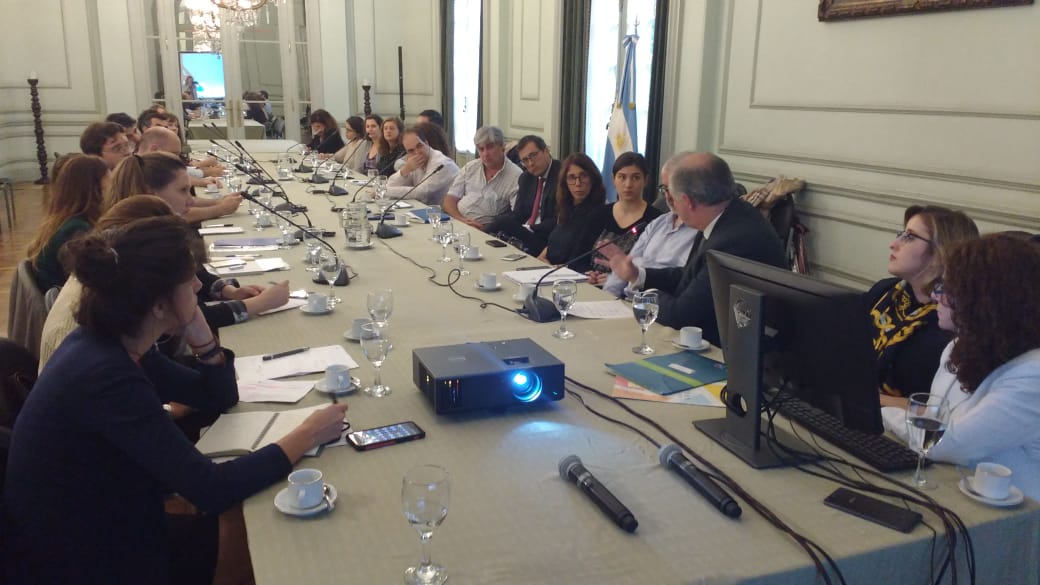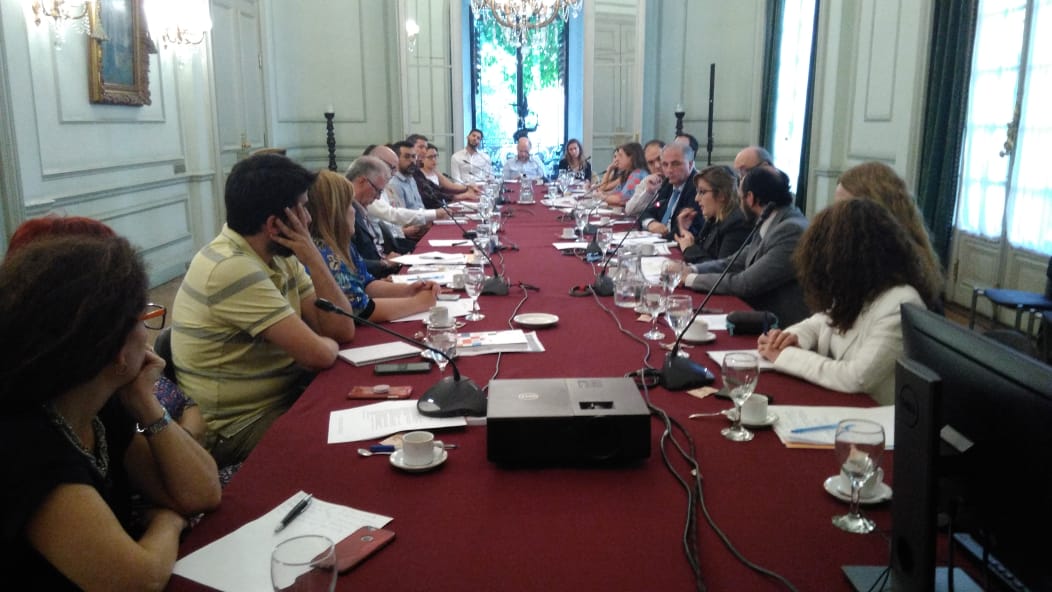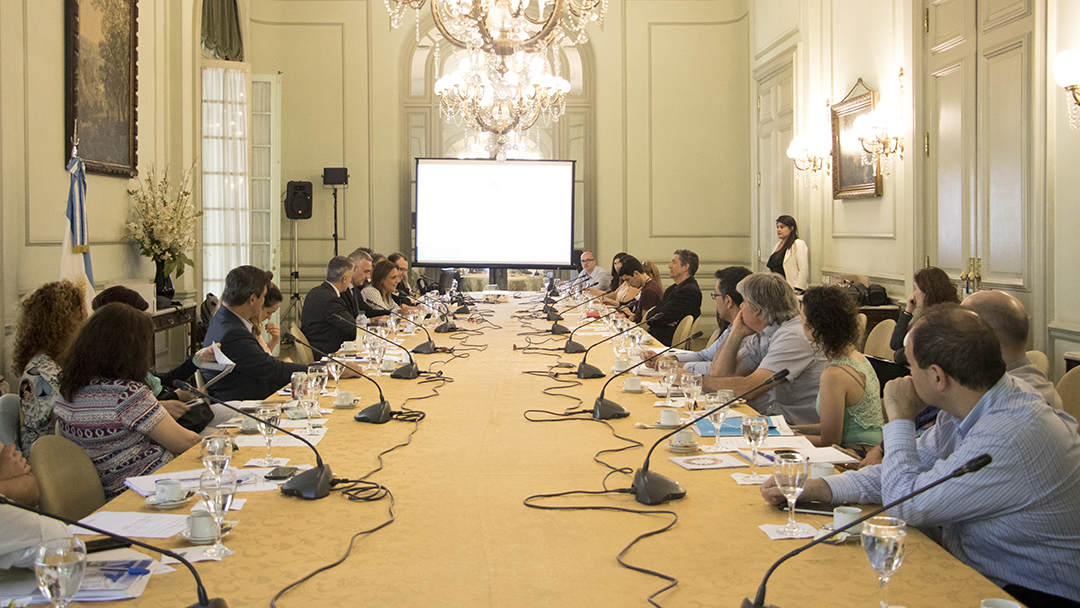Argentinean approach for an integrated and transversal 2030 Agenda implementation, monitoring and reporting
Description
This practice is about an integrated approach to 2030 Agenda implementation, monitoring and reporting. The National Public Policy Coordination Council (NPPCC) was the nominated office to coordinate the process. NPPCC determined the indivisibility of 2030 Agenda to avoid ‘cherry picking’ goals. Targets prioritization prior adaption to context was needed. Interventions and budget alignment towards targets and monitoring were immediately developed. A high level interinstitutional National Commission (NC) chaired by the NPPCC is the implementation mechanism. It was called in April 2016 and initially integrated by 18/20 ministries. In 2019, it remains as the institutional arrangement to oversee 2030 Agenda.
General objective: To develop and sustain an integrated and transversal approach towards 2030 Agenda implementation and monitoring.<br />
Particular objectives: To share with different governmental agencies 2030 Agenda vision and principles to promote institutional compromise, policy coherence (vertical and horizontal) and to galvanize action during implementation, monitoring and progress examination.<br />
To put on the spot the Agenda 2030 imperative of equality and non to strengthen universal respect for human rights present in the overriding message ‘to leave no one behind’.<br />
To integrate environmental, social and economic dimensions in goals review during adaptation.<br />
To facilitate visualization of targets interlinkages, trade-offs and synergies.<br />
To develop an agreed robust monitoring framework based on consistent targets, milestones and metrics.<br />
To integrate SDGs into national policies, priorities, interventions and resources. <br />
<br />
Challenges: Authorities political commitment. This challenge was initially facilitated by the President public announcement about tackling poverty and endorsing 2030 Agenda. Later, it was channelled through ministerial authorities accountability over certain targets. At present, political will is built through authorities´ delegates participation in the National Commission. Leadership, coordination and sustainment of the National Commission work as -a whole and of the working groups-. This challenge is overcome through a sustained technical support provided by the National Council. Robustness and methodological credibility on indicators construction. This is guaranteed by the standard technical sheets elaborated by sectorial statistical areas present in public agencies and reviewed by the National Council and the National Institute of Statistic and Census. The standard technical sheet is inspired on the IAEG-SDG proposed one. At present, Argentinean metadata comprises 242 technical sheets. It is considered a “living document” and a “work in process”. Integration beyond silos and sectors. It is pursued through targets interlinkages revision and inspiring cross -sectorial collaboration.<br />
Human rights based approach translation into action. This is done during landing and contextualizing the agenda at national level supported by the technical expertise of the Women National Institute and the Justice and Human Rights Ministry. The approach is reflected in indicators selection and disaggregation.<br />
Reporting and accountability. The integrated cross-sectoral approach is also present in monitoring and reporting. Strong coordination and collaboration are required to effectively monitor progress on 2030 Agenda implementation. Monitoring is done through a) indicators monitoring (more than 200 of indicators Tier I), b) reviewing consistency between interventions and targets and c) mapping governmental resources. Ministries and agencies make transveral contributions to the analysis which are later included in reports. Indicators (baselines, updated values, intermediate and final targets), interventions aligned towards targets and budget allocation are published at the National Council web site. The first National Voluntary Report (2017) and the first SDGs National Report (2018) are fundamental accountability instruments and play a strong role on national SDGs awareness, advocacy and campaigning.
The NPPCC brings stakeholders together to support implementation efforts led by government.
Public agencies delegates often mention that the participation in the NC is an enriching experience that has allow them to have an integrated of 2030 Agenda vision, to know other governmental areas with which interact and to align programs, projects and budgets with SDGs.
2030 Agenda implementation and monitoring was conducted by the National Public Policies Coordination Council based on its experience dealing with the Millennium Summit and Millenium Development Goals. Process initiation was done through targets prioritization in alignment with national policies. A National Commission integrated by 18 out of 20 ministries existing in 2016 was conformed to work in minor strategic thematic groups at the end of April of that year. Political and statistical profiles were required for the civil servants appointment. At that moment, main task was to decide about the core set of prioritized targets for the 17 Goals and their adaptation to the national context. During this phase, an integrated and collaborative effort was done in order to review targets and their interlinkages with an integrated perspective and, to select pertinent, relevant and feasible indicators considering the international monitoring framework. First list of targets and selected monitoring indicators was officialized en June 2017 in the National Voluntary Report. That was an important milestone that marked the progress tracking process beginning. Since then, new working groups were established to define indicators baseline, to establish intermediate and final targets for each indicator, to develop technical sheets, to align interventions to targets and to identify budgetary resources mobilized towards targets achievement. 2030 Agenda monitoring process is based on three elements: indicators, interventions and budgetary resources. Tracking progress is communicated through a public access platform, National and Voluntary Reports and other publications.
At the end of each year, since 2016, a summing-up of the work done and results achieved is shared in that session. The National Commission plenary consensus the plan for the following year based on a proposal presented by the National Council considering implementation and following up requirements, pending tasks and products. This simple plan has: agreed essential activities, milestones and products which are the object of the monitoring mechanism. National Commission work and products have external audits led by the National Supreme Audit Institution and internal ones conducted by the Internal Audit Unity. Both contribute to value & benefits oversight and constructive recommendations for SDGs implementation.
Participation in regional and international monitoring frameworks development. See National Country Report (2018). 2 leaflets for indicators dissemination (2017, 2018).
A National Voluntary Report presented at the HLPF (2017). The government invited stakeholders from the civil society and business sector to join the official delegation at the July 2017 HLPF. A National Country Report officially presented (2018). Short version of the National Country Report published by the National Congress Library (2018). Short version of the National Country Report in Portuguese (pdf format) (2018).
A technical document about national adaptation (2018). A report on SDG goals, targets and indicators regarding persons with discapacity in the argentinean proposal in comparison with the international one (2018). A report on the complete set of indicators analysis from the Human Rights approach elaborated by the Ministry of Justice and Human Rights (2017). A report with SDGs indicators with urban/rural desegregation –when pertinent-(2018). Integrating SDGs into national budgetary processes publication (pdf format). A public access platform web based to communicate and navigate SDGs indicators. Work in progress. A public access navigator of the linkages between Governmental Objectives and Priority Initiatives, and SDGs Goals and Targets. Positive impacts. Rapid 2030 Agenda dissemination at national governmental level. Public agencies accountability on targets. Public agencies links to work collaboratively. Statistical sectorial capacities improved. An established national mechanism to track progress towards SDGs. Longer term results. In first place, it is expected that this collaborative work will improve institutional capacities (analytical and statistical ones) to work with complex integrated aspirational agendas in the medium and long term. In second place, it is expected that the national mechanism contributes to ensure integrated policy coherence for sustainable development. In third place, it is also expected that the National Commission consolidates as a key pillar in the governance structure. Contributions to no Leave No one Behind.Implementing the pledge, thus, does not imply a separate course of action but is intrinsic to the action required to achieve the SDGs. The first step is to understand who is being left behind and why. Disaggregated indicators help to identify vulnerable persons. Human rights based approach contributes to explain which are the causes that vulnerate them. An integrated approach may also contribute to imbibe 2030 Agenda pledge in implementation tracking and progress analysis. Monitoring reports are envisaged to be useful for integrated policy formulation, implementation and evaluation.
To involve academy, civil society organizations, parliamentarians, business sector, and so on for action. Barriers to inclusion. Overcoming constraints was done thorough: Localizing SDGs at provincial and local levels. The National Commission as a forum to discuss and understand targets interlinkages and ‘trade-offs’ across goals/targets and the need for integrated policies and interventions. The development of a methodology to identify, analyse and monitor budget contributions to SGGs. Also cconsistency across plans, budgets, expenditures, progress analysis and reporting is sought in the National Commission work. The establishment of cooperation agreements with mentioned actors to engage them in collaborative activities to promote the 2030 Agenda and to orientate action and to raise awareness among citizens on it. Even though an inclusive participatory process haven’t been at the centre of the Argentinean Government work, the interaction between public agencies and civil society organizations, business sector and academy is promising as also was stakeholder invitation to be part of the official delegation participating in the 2017 HLPF. The participation at Parliament commissions and observatories (2030 Agenda and Human Rights) to channel additional support. Innovations that the practice may have brought about. Cross -sectorial collaboration in the public administration beyond silos and sectors seeking for a whole government approach.A comprehensive agreed monitoring framework.
Argentinean systematized experiencie can be used for peer learning purposes as an example of a good practice regarding a transversal implementation of the 2030 Agenda at the national level. It also provides elements to build coalitions across sectors in the public administration. This cross sectorial collaboration includes rising awareness on sustainable development, providing inputs for policy makers, contributing to implementation monitoring and enhancing cooperation. Every year, in the first meeting of the National Commission, its members reaffirm their commitment to continue with the collaborative work to develop the Plan agreed in the last meeting of the year.<br />
Argentinean process of monitoring goes beyond statistics assessing progress towards sustainable development. This is done complementing indicators with the analysis of the policies implemented and the resources mobilized.
http://www.odsargentina.gob.ar/Nacion
http://www.odsargentina.gob.ar/RelacionesInstitucionales
http://www.odsargentina.gob.ar/PublicacionesODS
http://www.onu.org.ar/argentina
https://www.onu.org.ar/category/ods
https://www.onu.org.ar/presentacion-de-los-avances-en-la-adaptacion-arg… https://plataforma.odsargentina.gob.ar/explora
http://www.odsargentina.gob.ar/VinculacionODS
SDGS & Targets
Deliverables & Timeline
Resources mobilized
Partnership Progress
| Name | Description |
|---|---|
| 14.5 | By 2020, conserve at least 10 per cent of coastal and marine areas, consistent with national and international law and based on the best available scientific information |
| 14.a | Increase scientific knowledge, develop research capacity and transfer marine technology, taking into account the Intergovernmental Oceanographic Commission Criteria and Guidelines on the Transfer of Marine Technology, in order to improve ocean health and to enhance the contribution of marine biodiversity to the development of developing countries, in particular small island developing States and least developed countries |
Feedback
Action Network


Timeline
Entity
Region
- Latin America and the Caribbean
Geographical coverage
Photos



Website/More information
Countries

Contact Information
MARIA EUGENIA BRISSON, MASTER OF ARTS
